The White spider has been around for several years now. It was
originally invented by Carl Hanson And Lane "Smitty" Smith. The
original pattern was all white and is still an effective bream
fly. However, fly tyers love to experiment and soon "spiders"
with different colored rubber legs and tails were being tied.
Orange are were said to be exceptionally good.
My own addition to the "spider" family has a gray body, red "sash" and yellow legs and tail.
|
|
Material List
|
|
Hook:
Thread:
Tail:
Body:
Legs:
|
Mustad 3366 size 10 or 12
size 03
Marabou
2/3mm foam disk approx 1/2" wide
foam legs material.
|
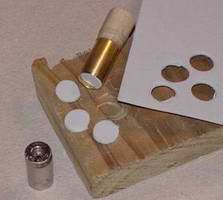 Step 1. Step 1.
|
Cut out foam disks
from 2mm or 3mm craft foam. You can use a .45 casing or cut a
piece of hobby copper about 2in. long. Sharpen the
edge. Press down firmly, then twist. Cut as many as you
need. If they stick in the die, dig them out with a dubbing
needle.
I use 3mm on a no10 hook for most of my spiders, but can't get in Gray,
so I use 2mm on a no12 hook. They float better that way.
|
Step 2. Tie in at the middle of
the hook by making about 10 turns forward and 10 turns backward.
Return to the center of the thread base.
|
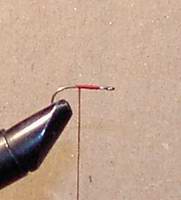
|
Step 3.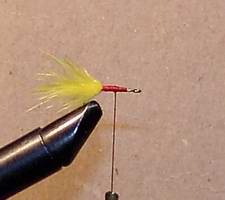
|
Cut a clump of
marabou About 1 1/2 the length of the hook. You can go heavy
on the quantity of tail.. Tie in and bring the thread back to the
center of the shank. (I usually put 2 or 3 half hitches here, to
stabilize the fly)
|
Step 4. Fold over the foam
disk and press it around the hook. The more you mash the
better. If you don't put enough pressure on it and start to
tighten the thread, the body will spin around the hook
shank.
Make two turns. Tighten, then make four or five more turns. (I use another 3 half hitches here.)
|
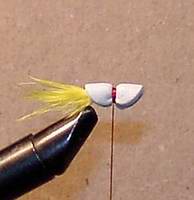
|
Step 5. 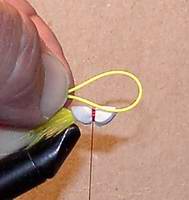 |
Cut a rubber leg about 1" long. Fold the leg over and wrap two turns
to hold the legs in place. Adjust the legs and apply two half hitches. |
Step 6. take a couple of wraps
under the foam, around the hook, behind the eye. Tie off
. Cut the loop in the legs, and pull them till they're on
each side of the body. They should form an X, but don't worry if
they don't. The fish don't care.
|
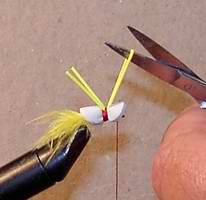
|
Step 7. 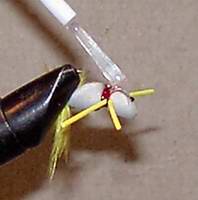
|
I apply glue to the bottom of the fly rather than the top. Let the fly dry and you're ready to fish.
|
|
Notes on the fly.
Color: There are any number of craft foam colors,
marabou colors and rubber leg colors. There's nothing that says a
spider has to be white, on white, in white. You can experiment
with thread, body, legs and tail all you want.
Legs: How long should the legs be? Length
shouldn't be so long that the fish grab the legs rather then the
fly. I've even tied this fly without legs when they get to be to
good at grabbing a "drumstick!" I've fished long legs and short legs with success.
How thick should they be? I normally use medium leg material, but thin legs abound.
|
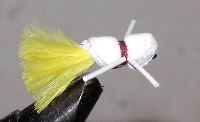
An example of a mix and match spider. white body and legs, yellow tail and red thread.
|